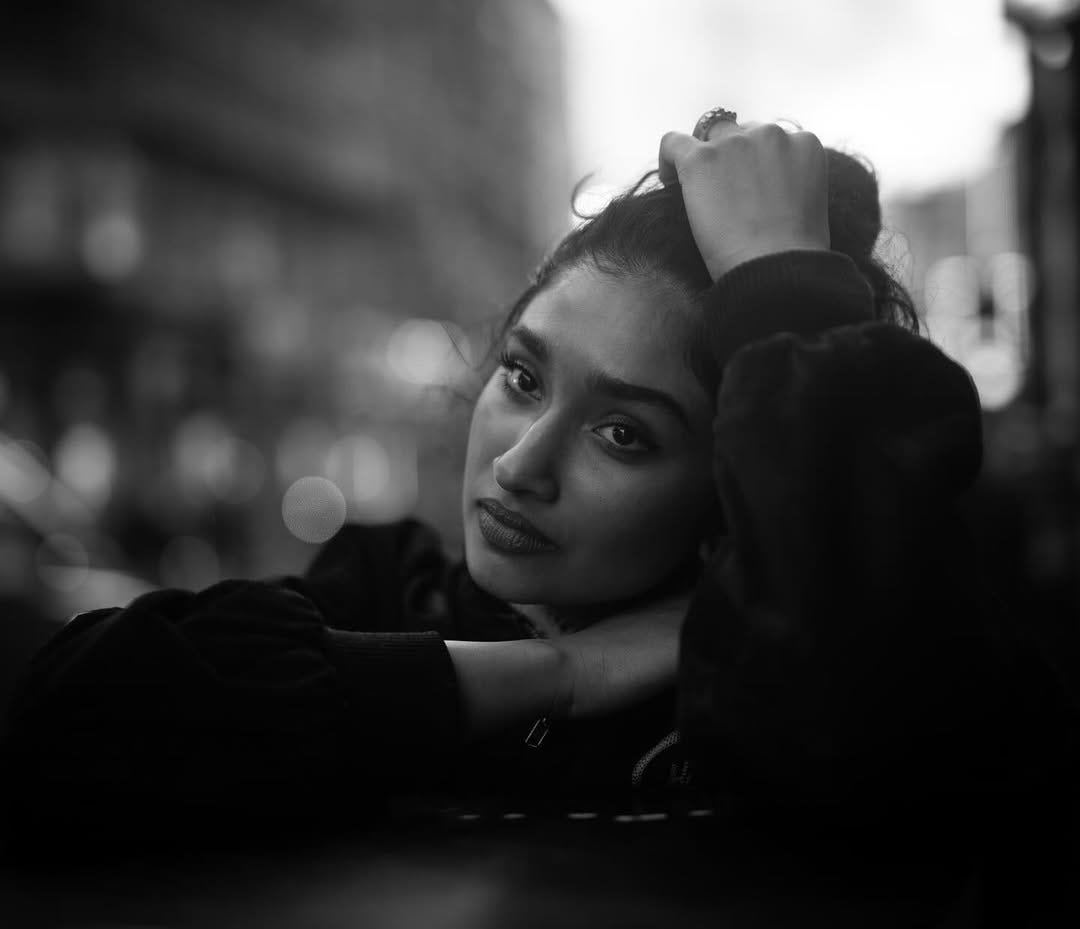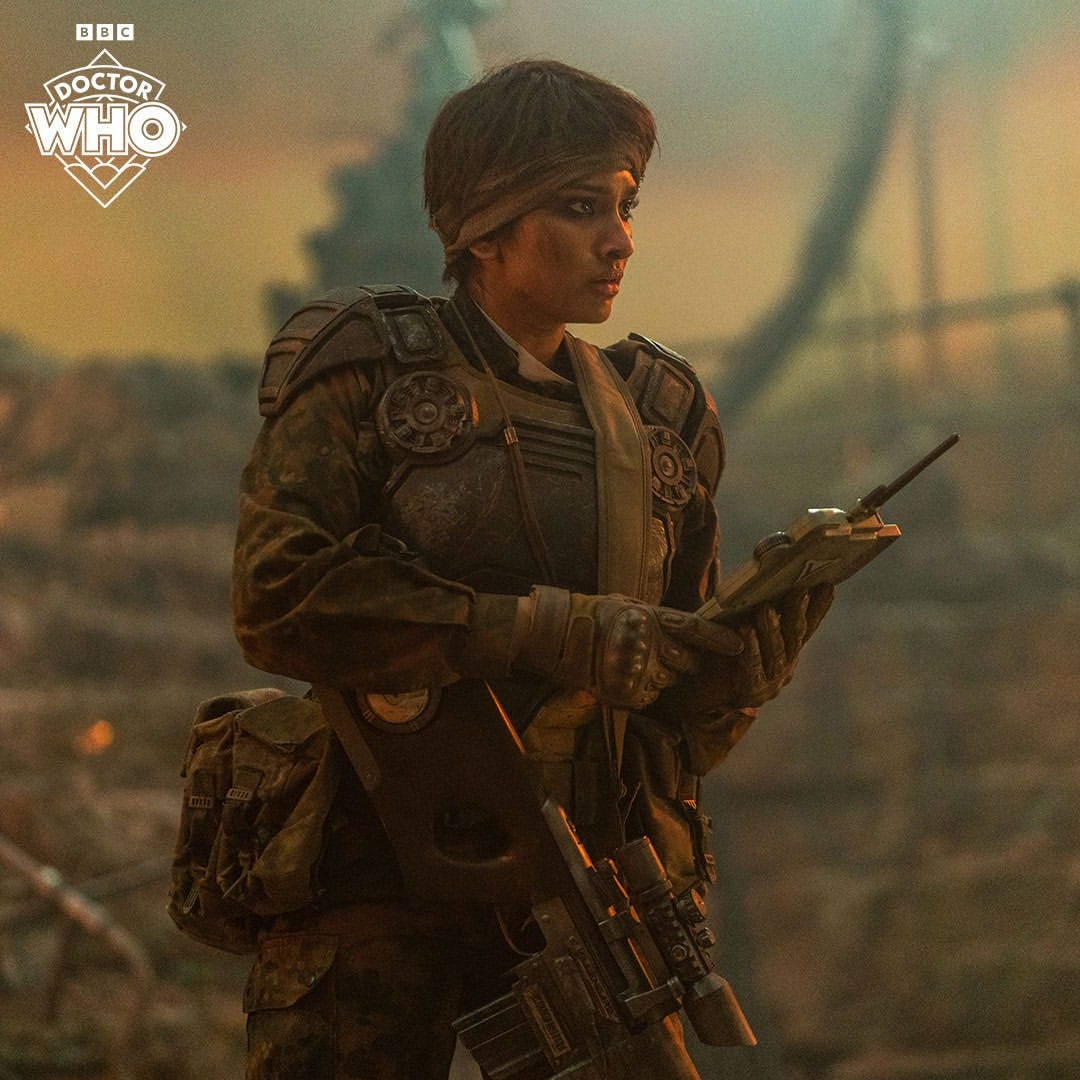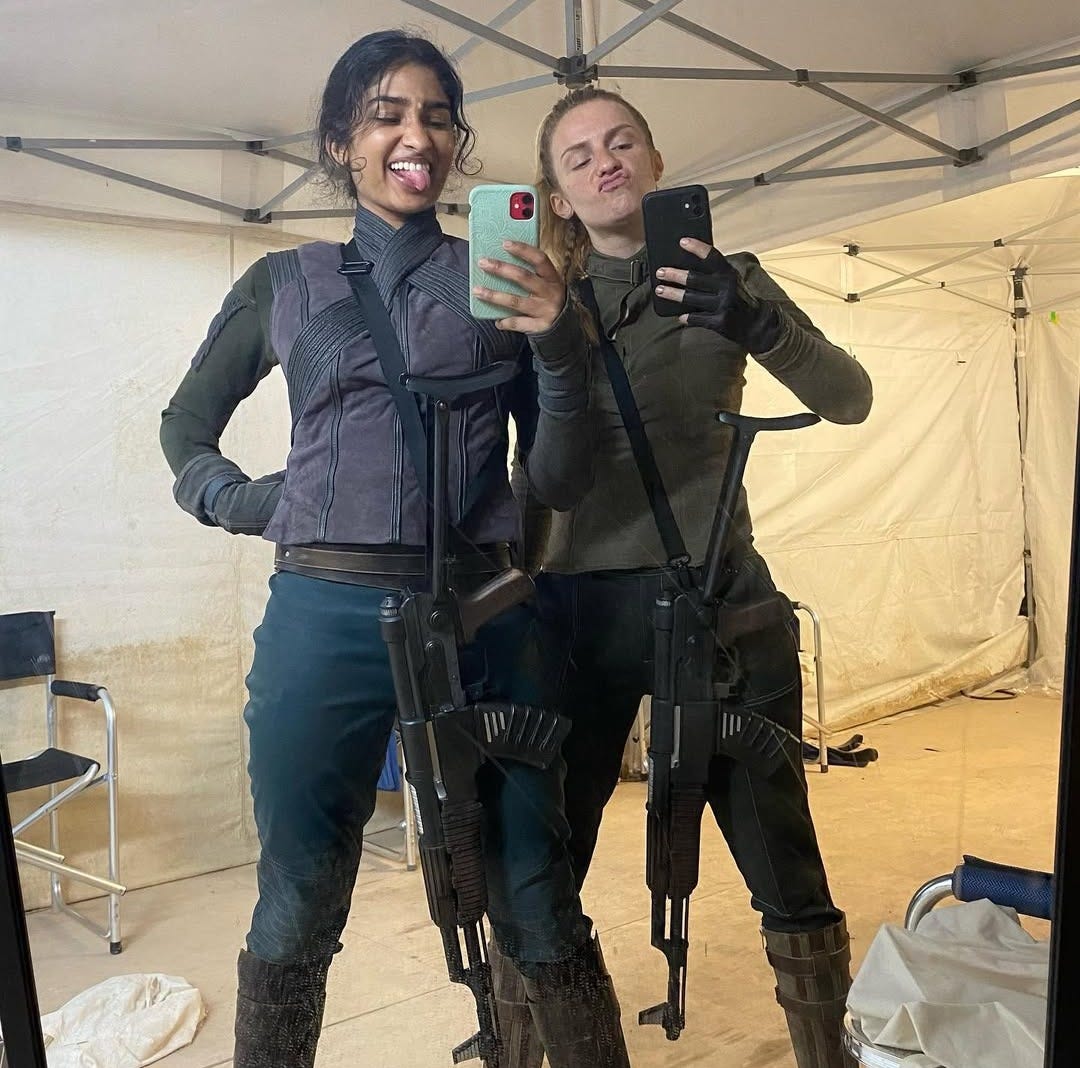Broadcasting: Varada Sethu
British Indian actor Varada Sethu talks about the importance of honouring specific lived experience when playing characters, the freedom of vulnerability and why therapy changed her life.
It’s less than ten days until Christmas and, if you live in a big city, you’ll know that this is a recipe for elbows in your face on sweaty journeys, cramming yourself into a photo booth with a colleague that you have never and will never speak to again, and “unmissable” deals that leave you staring at the candle section in TK Maxx for approximately 45 minutes before abandoning your basket and walking out. All things that lead to irritable humans, riddled with passive aggressive energy that you can’t help but take on yourself. God forbid your foot accidentally touches someone else’s as you scramble onto the tube and you have to endure the remainder of the journey with them furiously spitting on and wiping their shoes, maintaining eye contact with you the whole time. It takes a lot of strength (that I clearly don’t have) to remind yourself that whatever day someone is having, it doesn’t have to seep into yours. Or, as this week’s guest Varada Sethu so eloquently puts it, to regard people’s behaviour with curiosity, to remain empathetic without being dragged into someone else’s headspace.
She is, of course, talking about something much more profound than me standing inches from someone as they repeatedly spat on their own shoe. Born in Kerala, India, and raised in Newcastle, Varada is wise beyond her years, and the conversation we have revolves around embracing vulnerability, holding moments with lightness and protecting your energy. As an actor, she has starred in the likes of Hard Sun (BBC), Andor (Disney+), and, most recently, Doctor Who, playing opposite Ncuti Gatwa. As a person, Varada promised herself to always be open about her mental health struggles, and it’s a promise I feel extremely privileged to be on the receiving end of during this conversation.
TW: depression and suicide.
“I think the tortured artist trope is a really damaging one. I don’t think trauma makes you a ‘better’ artist. When I am anxious, I get smaller and smaller. I lose my ability to play. As an actor, if you don’t have access to play, what do you have?”

When taking on a role, how important is it for you to share an element of lived experience with your character?
In some instances, I think it’s very important, but in others not so much. For example, if I was asked to audition for a role to play a non-binary or a trans character, I’d say no. Not only because it’s lived experience I don’t have, but also because there aren’t enough roles for trans and non-binary actors anyway, so I wouldn’t want to take that representation away from them. I think there are some boxes that should be ticked, regardless. There are Indian actors to play Indian characters, trans actors to play trans characters, etc. I remember, early on in my career, I got an audition through to play a Native American character for something where the indigenous experience was at the very core of the idea. I was like, did you just read Indian and think that’ll do?! You can’t just have any old brown person! I think acting is always about finding the truth in a character, finding your version of that truth and bringing it to the role. Yes, I could play a murderer without having killed someone, but I think there are certain instances where it’s simply wrong not to honour lived experience.
What about things that an actor might not necessarily want to disclose about themselves - mental health, sexuality, disability? Do you think we live in an age where there is an obligation or even a need to share lived experience in order to get certain roles?
No-one should ever have to disclose anything, but it’s tricky when there is still such a long way to go in terms of representation. I worry that social media makes things more difficult because we feel as though we deserve to know things that are within people’s rights not to discuss or share. I am grateful for being the age I am, because - once upon a time - social media was new. I am old enough to understand that it isn’t the only way of communicating or connecting with people. I can detach myself from it. I don’t feel obliged to share things I don’t want to. I am quite private. I don’t talk about my family or my dating life, but I promised myself that I would always be open about my mental health struggles if anyone asked me about that. When I was in my darkest moments, what made it harder for me was feeling like I was the only person going through it. I didn’t want to go to the doctor because I felt like I was “crazy”. I didn’t know how deeply depressed I was because no-one ever spoke about what depression actually looked like.
If you feel able to, can you share a little bit more about that experience now?
It was whilst I was at university. I’d spent my gap year getting a taste of working professionally as an actor. I’d played a role in an indie film called Sket, which was my first time on a proper set, and I did a few commercials too. I loved it so much, but my parents were worried about acting being an unstable career (and they would be right to think that!) so they wanted me to get a degree first.
After just a month of studying to become a vet, I knew I couldn’t do it. I remember being on a train with my dad and wanting to say something but being unable to. I was sweating and my heart rate was through the roof. It was actually him who turned to me and asked, “are you happy doing veterinary science?”. He’d been dealing with a medical student who hadn’t come into uni for a while because they were struggling with depression. It got so bad and they ended up getting sectioned. I think that’s what prompted my dad to ask me. Not only to ask but to be open to my answer to his question being no. The compromise I came to with my parents was that I’d switch to physiology, which was three years rather than five, graduate university and then pursue acting. I don’t hold that against them at all; they just wanted me to be secure. But the next three years were horrible, for reasons that run much deeper than the course itself. Every day felt like a betrayal to myself. I don’t regret it, because I learnt so much about myself and my resilience, but it was really tough.
It’s hard to imagine where your life would be if you extracted an experience from it, so - although it sounds really difficult - do you think you’d be where you are now without it?
It’s interesting you phrased it like that, because I remember telling someone that it felt like my life was a jar of water that I’d poured ink into. I said some awful things when I was in the depths of my depression, and I felt like that jar was never going to be pure again, that I was never going to be able to separate the me then from the me now. I had a meltdown in 2016 and it was the final trigger for me to seek help, after not doing so for so long.
Therapy has transformed my life, and I don’t say that lightly. It’s taught me how to engage with trauma and things that have happened in my past in a helpful and healthy way. I used to be terrified of inhabiting roles where the character was depressed or suicidal, because I was so scared that if I let myself even imagine going back to that headspace, I wouldn’t be able to crawl back out. Therapy has taught me that I am strong enough to. That I can look something in the face that terrifies me and get through it. That, even if I fall back into that pit, I have the tools to pull myself out. As an artist, it’s made me braver in connecting with and accessing difficult emotions, and then letting go. But, and I think this is an important distinction to make, it’s therapy that has made me a better actor, not the trauma itself. I think the tortured artist trope is a really damaging one. I don’t think trauma makes you a ‘better’ artist. When I am anxious, I get smaller and smaller. I lose my ability to play. As an actor, if you don’t have access to play, what do you have?
You mentioned earlier knowing that you always wanted to act. Is a desire to play where it comes from for you?
Living in a fantasy was my form of escapism when I was younger. If things aren’t great in my life, I throw myself into film, books and TV. Now, I feel like being able to offer that escapism for other people is such a powerful thing. But it was never that conscious a feeling when I was younger. Spending the first six years of my life in India, where I was born, film and TV was such a huge part of the culture. My grandmother’s on both sides just loved TV so much. Indian culture idolises Bollywood stars; I grew up with them as my heroes. I suppose part of my desire to act was wanting to be seen in that light, to be validated in that way. I’ve never really put two and two together like that, but I think that’s where it comes from.
It also means I am often chasing an idea of perfectionism that just doesn’t exist, made all the more difficult by my ADHD which has me feeling as though I am chronically underachieving anyway! I think that feeling is also compounded when you’re a person of colour. I feel as though everything I do is scrutinised, like it’s my responsibility to succeed so that I can set the bar for other people. I am really trying to let go of that idea of perfection though. So much goodness comes from embracing vulnerability, from holding a moment lightly. Not stopping yourself from doing something because you’re scared of failing. I’ve definitely done that. I watch myself back in some of my earlier roles and I can see that I am not inhabiting space in the way I should be, because I’m so terrified of being vulnerable. I think that the best things, in acting and in life, come from accessing vulnerability.
For me, being vulnerable is largely to do with the situation I’m in or the people I’m with. How do you manage to access vulnerability when, for example, there might not be the most welcoming atmosphere on set?
For a long time, I had only worked on sets that were amazing. People kept commenting on how lovely everyone was, but I didn’t know any different, until I found myself in a really toxic environment. As a people pleaser, I really struggled with that. I had such a co-dependent way of interacting with humans; if someone lost their shit on set, I didn’t know how to separate myself from that. That job taught me how important it is to protect your energy. It’s that energy that makes you sparkle in an audition or light up a scene.
Now, I try to remind myself that I’m just a blip in someone’s day, in their version of events. We might share the same environment, but we are separate in our experiences and how we view the world. What I love about therapy is that it’s taught me how to be a bit of a detective into the human condition. How to regard people’s behaviour with curiosity, rather than taking everything on myself. I can be empathetic without being dragged into someone else’s headspace. It’s tough to be on the receiving end of an explosion, but I try to be curious about why someone is behaving like that, rather than seeing it as a reflection of me. I used to take anything bad that happened to me as proof that life was against me, but now I take it as proof that I can get through life.





